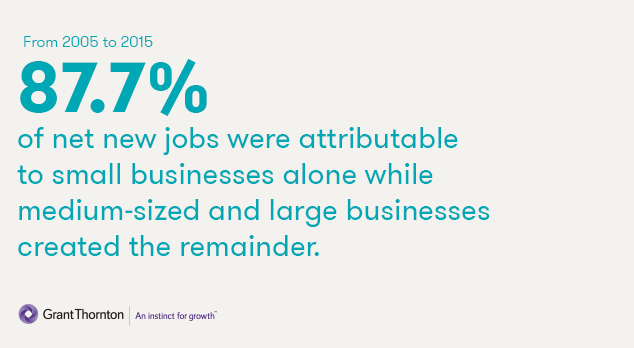Entrepreneurship in Canada
Entrepreneurship is a powerful force driving innovation, productivity, job creation and economic growth. Countries with a high level of entrepreneurial activity tend to be better off economically. Entrepreneurs have made fundamental impacts throughout the history of Canada, and today more and more Canadians from all walks of life are becoming, or thinking of becoming, entrepreneurs.
Canadian entrepreneurs are celebrated in their communities and in the media, and, in an age where people are cynical about many public figures, they are becoming our new role models.
Overcoming risks to reap the rewards
Given the significance of entrepreneurship to Canada, it is important to understand how well Canadian entrepreneurs are meeting these challenges.
The decision to start a business involves a cost-benefit analysis – while entrepreneurship carries significant risk, the rewards can be great.
Having a great idea is not enough.
In order to achieve profitable growth – and a sustainable business – entrepreneurs must consider the personal financial implications, in addition to corporate factors such as taxation and government funding, and how they shape entrepreneurship.

Entrepreneurial activity has been largely stable since 2001, and the rate of business start-ups has increased.
What drives an entrepreneur?
As the popular saying goes, “do what you love, and you’ll never work another day in your life.”
This also applies to entrepreneurs, as a majority of Canada’s small and medium business owners consistently report that passion is a stronger motivator for them than personal financial gain. This applies regardless of age – millennial entrepreneurs and boomer entrepreneurs alike have reported3being passionate about what they do.
For most boomers, entrepreneurship is a planned stopover on the road to retirement. Over half reported they have already started or are considering starting a small business before they retire.
Of these, most stated that their main motivation was a desire to be their own boss.
Meanwhile, Canadian business owners are becoming older, with approximately half of all entrepreneurs in the 50 to 64 age range.
Other than motivation, and a desire to turn passion into a career, what makes an entrepreneur?
If you see possibilities where others see problems if you are not afraid to take on initiatives, and if you are curious and continually in search of discovery, you’re off to a good start.
Introduction
Entrepreneurs have always existed in Canada. From the earliest days, Aboriginal people traded among themselves, and when Europeans arrived on these shores, a lucrative global fur trade was launched. Vast fortunes were later amassed by Canadian entrepreneurs who have become household names, such as Roy Thomson, Timothy Eaton and John Molson.
But in recent years, more people than ever are becoming, or thinking of becoming, entrepreneurs. What are the reasons for this trend? Three stand out.
The implicit understanding between employers and employees has changed. In the past, people expected to be retained as employees as long as they did their jobs.
Recent economic downturns, though, have been accompanied by downsizing and people want to regain control over their pay cheques by starting their own business.
People — especially younger people — increasingly prefer an independent lifestyle.
They want to do work they like and have autonomy over their hours and working conditions.
Entrepreneurs have become influential.
Canadian entrepreneurs are celebrated in their communities and in the media, and, in an age where people are cynical about many public figures, they are becoming new role models.
Canada is an appealing place to start a business, but fewer are choosing to do so
The state of entrepreneurship in Canada
is healthy overall and compares favourably to other developed economies, but there are fewer new businesses than before, and most owners of small and medium-sized businesses are getting older.

Although it is relatively easy to start a business, data issued by Statistics Canada found that business entry and exit rates have steadily decreased8 over the last 30 years.
The entry rate, in particular, has declined from 24.5 percent in 1983 to 13.1 percent in 2012, and remained relatively flat at 12.4 percent in 2017, while the exit rate (which is closely correlated with the entry rate) was 11.5 percent in 2017.
Entrepreneurial activity, is not just good for entrepreneurs themselves. It benefits all Canadians.
Entrepreneurship is a powerful force driving innovation, productivity, job creation and economic growth.
What is Entrepreneurship?
Entrepreneurship is a process that starts with someone — the entrepreneur — recognizing an opportunity to create something new. More formally the definition used in this report follows that of the Organisation for Economic Co-operation and Development (OECD):
Entrepreneurial activity is “enterprising human action in pursuit of the generation of value, through the creation or expansion of economic activity, by identifying and exploiting new products, processes or markets.”
An Overview of Canada’s Entrepreneurial Performance
The birth rate of Canadian firms has consistently been higher than the death rate.
Just over half of Canadian businesses survive their first five years of operation.
Canada’s business birth and death rates compare favourably with other countries.
Canada’s business survival rate compares favourably.
The proportion of high-growth firms in the Canadian manufacturing sector is comparably high, while the proportion of high-growth firms in the services sector is comparably low.
Roughly one in 15 working Canadians owns an incorporated business.
Just over one-third of Canadian SMEs are owned by women.
Canadian SME owners are acquiring higher education levels.
Canadian SME owners are becoming older and need to start planning for succession. We will soon see a greater transfer of businesses to next-generation family members or to outside buyers.
Canadian SME owners have become more diverse, reflecting a greater diversity in the Canadian population.
Owners of larger businesses are wealthier.
Most SME owners started their business from scratch.








